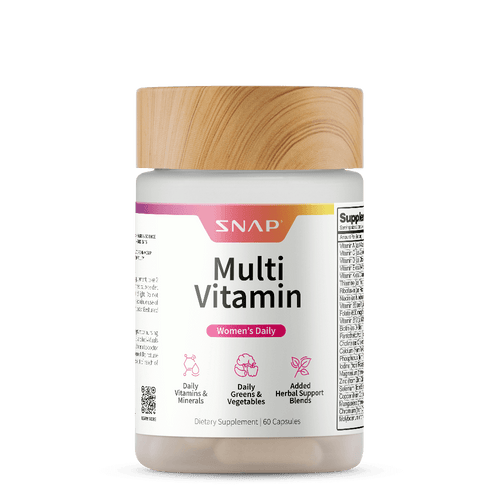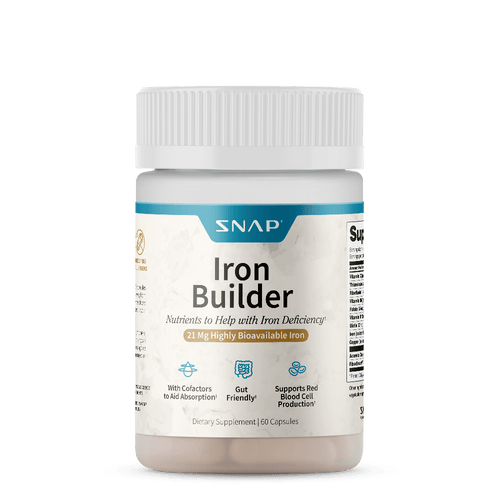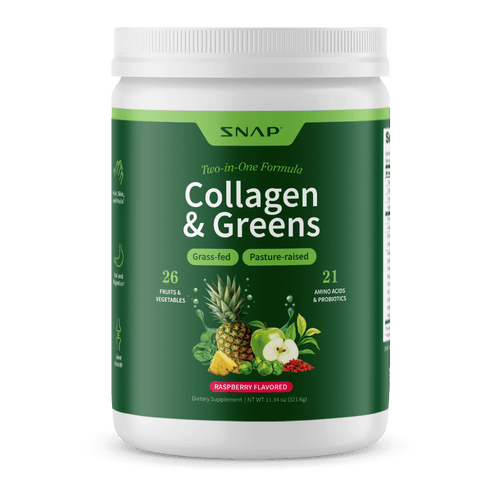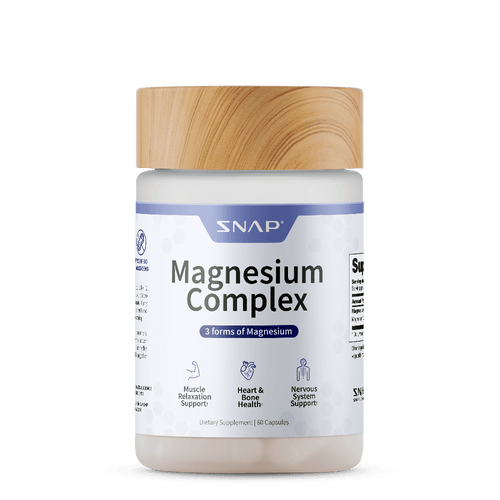Are you getting the right mix of vitamins and minerals for your body to thrive?
While most of us know that vitamins and minerals are crucial for our well-being, it’s easy to overlook the specific ones our bodies truly need. From immune support to boosting energy levels, the right essential nutrients can make all the difference.
Magnesium, vitamin C, and B vitamins are some of the foundational nutrients that your body relies on daily. But with our modern diets often falling short, it’s vital to bridge those gaps.
Snap Supplements offers a great solution, combining modern science with the power of natural ingredients. Our premium products are designed to help you optimize your health, ensuring your body gets the right nutrients it needs to function at its best.
When it comes to health, your body needs more than just a one-size-fits-all approach. Incorporating whole-food-derived vitamins into your routine is one of the best ways to provide effective nourishment.
In this blog, we will cover:
-
The importance of understanding essential vitamins and minerals for your body.
-
The difference between whole-food-derived and synthetic vitamins.
-
How to ensure you're meeting your nutritional needs with whole-food supplements.
Let’s get started!
$27.00

Multivitamines pour femmes
$32.00
Understanding Essential Nutrients
Eating a balanced diet rich in macronutrients and micronutrients is key to maintaining your health. Learning about how your body absorbs these essential nutrients can help you make better choices about what to include in your meals.
Differences Between Vitamins and Minerals
Vitamins and minerals, though often mentioned together, are distinct.
Vitamins are organic compounds crucial for various body functions. They fall into two categories: fat-soluble (A, D, E, K) and water-soluble (B-complex, C). Fat-soluble vitamins can be stored in your body for longer, while water-soluble ones require frequent replenishment through diet.
Minerals, on the other hand, are inorganic elements like calcium, potassium, and iron. Your body uses them to form bones, make hormones, and regulate heartbeat. Unlike vitamins, minerals can withstand processing, cooking, and air exposure without losing efficacy.
$28.00

Constructeur de fer
$33.00
The Role of Macronutrients and Micronutrients
Macronutrients include carbohydrates, proteins, and fats, providing the energy you need daily. They are crucial for growth, metabolism, and maintaining body functions. You often consume them in larger amounts through your meals.
Micronutrients, including vitamins and minerals, are required in smaller quantities but play a vital role in bodily functions like immunity and bone health. A deficiency in micronutrients can lead to health issues such as weakened immunity or bone problems.
Bioavailability and Nutrient Absorption
Bioavailability refers to how well your body can absorb and use nutrients.
Factors like food preparation, age, and health status can impact this. For example, fat can increase the absorption of fat-soluble vitamins, whereas calcium may hinder iron absorption when consumed together.
Eating a varied diet enhances nutrient absorption. Cooking methods, such as steaming instead of boiling, can preserve vitamin content. Promoting effective nutrient absorption ensures your body benefits from the foods you eat.
You can support better bioavailability by choosing high-quality supplements and organic vitamins essential for optimal health.
Vital Vitamins for Whole-Body Health
Your body needs a range of vitamins to function well. Vital for energy, immune support, skin, and overall wellness, these vitamins are often gained from food and supplements. Here, you’ll explore fat-soluble and water-soluble vitamins, understanding their key roles in maintaining health.
Fat-Soluble Vitamins: A, D, E, and K
Fat-soluble vitamins are stored in your body's fatty tissues and liver.
-
Vitamin A supports vision, immune function, and skin health. You can find it in foods like sweet potatoes and carrots.
-
Vitamin D is crucial for bone and immune health. It is often sourced from sunlight exposure and fortified foods. Without enough, bones may become weak.
-
Vitamin E acts as an antioxidant, helping protect cells from damage. Nuts and seeds are excellent sources.
-
Vitamin K is essential for blood clotting and bone health. It is found in leafy greens like spinach.
Water-Soluble Vitamins: C and B-Complex
Water-soluble vitamins need regular replenishment since they are not stored in the body.
-
Vitamin C is an antioxidant that aids in collagen production and immune defense. Citrus fruits and bell peppers are rich sources.
-
The B-complex vitamins include B1 (Thiamine), B2 (Riboflavin), and B3 (niacin). They support energy production and brain function. Whole grains and lean meats can provide these nutrients.
They play varied roles, like converting food to energy and maintaining healthy nerve function. Consider adding supplements from Snap Supplements to ensure you get enough of these essentials, especially if dietary intake is insufficient.
$52.00

Collagène et légumes verts
$62.00
Key Minerals and Their Functions
Key minerals are essential for various bodily functions. They support bone health, oxygen transport, and immune function. The following sections highlight important macrominerals and trace minerals crucial for maintaining good health.
Macrominerals: Calcium, Magnesium, and Potassium
-
Calcium is vital for building and maintaining strong bones and teeth. It also plays a role in muscle function and nerve signaling. Dairy products, green leafy vegetables, and fortified foods are good sources.
-
Magnesium supports over 300 biochemical reactions in your body. It helps muscle and nerve function, stabilizes blood glucose levels, and aids energy production. You can find magnesium in nuts, seeds, and whole grains.
-
Potassium is crucial for maintaining normal cell function. It helps control the balance of fluids in your body and supports nerve transmission and muscle contraction. Bananas, sweet potatoes, and spinach are excellent sources of potassium.
$31.00

Complexe de magnésium
$36.00
Trace Minerals: Iron, Zinc, and Selenium
-
Iron is necessary for producing hemoglobin in red blood cells, which transports oxygen throughout your body. You can find iron in meats, beans, and fortified cereals.
-
Zinc is vital for immune function and healing, DNA synthesis, and cellular metabolism. Good sources include meat, shellfish, and legumes.
-
Selenium helps protect your cells from damage and supports thyroid function. Brazil nuts, seafood, and eggs are rich in selenium.
Benefits of Essential Nutrients
Essential nutrients play a vital role in various bodily functions. They support your immune system, enhance bone health, and aid energy metabolism and muscle function.
Immune System Support
Vitamins and minerals are key to keeping your immune system robust.
Vitamin C in citrus fruits helps your body produce white blood cells. These cells fight off infections and keep you healthy. Zinc, a mineral in nuts and seeds, also strengthens your immune response by activating enzymes in your white blood cells.
Remember to maintain a balanced diet rich in whole foods. This ensures you get enough essential nutrients naturally, improving your immune defense.
Bone Health and Density
Calcium and vitamin D are crucial for healthy bones and teeth.
Calcium builds and maintains bone mass, while vitamin D helps your body absorb calcium more effectively. Dairy products, leafy greens, and fortified foods are excellent sources of calcium. Sun exposure provides vitamin D, but supplements can be beneficial if you get limited sun.
Magnesium and vitamin K also contribute to bone strength. Magnesium, present in whole grains and nuts, supports bone mineralization, while vitamin K, found in leafy greens, aids in bone protein utilization.
Combined, these nutrients help maintain bone density and reduce the risk of fractures.
Energy Metabolism and Muscular Function
Your body needs B vitamins like B1, B2, and B6 for effective energy metabolism.
These vitamins help convert food into energy. Whole grains, meat, and eggs are good sources of B vitamins. Iron is also important, especially for oxygen transportation in the blood, which powers your muscles.
For active individuals, magnesium is essential for muscle relaxation and contraction. Lack of magnesium can lead to cramps and fatigue. Potassium, found in bananas and sweet potatoes, also helps muscle function by maintaining fluid balance and nerve signals. Including nutrient-rich options can boost your energy and muscle efficiency.
By combining the benefits of modern science and natural ingredients, you can optimize your health effectively.
Nutrient Sources and Dietary Recommendations
Focusing on where you get your vitamins and minerals is crucial for maintaining good health. This section explains the benefits of choosing whole foods over supplements, outlines basic dietary guidelines for essential nutrients, and advises dealing with nutrient deficiencies.
Whole Foods vs. Supplements
Choosing between whole foods and supplements can impact your health.
Whole foods offer a variety of nutrients and are often richer in fiber and antioxidants. This makes them helpful in improving digestion and reducing inflammation. Supplements can help if your diet lacks certain nutrients. For example, some may find it hard to get enough Vitamin D, making supplements beneficial.
Yet, it's important not to rely solely on supplements. Real foods provide additional health benefits that supplements can't match.
Balance is key—use supplements to fill gaps rather than replace meals.
Dietary Guidelines for Essential Nutrients
Following dietary guidelines can help ensure you get the nutrients you need.
Aim to fill half your plate with fruits and vegetables. These foods are rich in vitamins like C, A, and K. Whole grains provide essential B vitamins and minerals such as magnesium and iron.
Protein sources, like lean meats, beans, and nuts, supply essential nutrients like zinc and B12. For healthy fat, include fish, avocados, and nuts with omega-3 fatty acids.
Proper hydration is equally important. Water helps with nutrient distribution and overall health. Tailor these guidelines to your personal needs, focusing on a mix of nutrients from varied sources.
Addressing Nutrient Deficiencies
It's crucial to identify which vitamins or minerals are lacking when dealing with nutrient deficiencies. Blood tests can help identify deficiencies such as low iron or Vitamin D.
If you discover a deficiency, consult a healthcare professional. Receiving expert advice ensures that you address it correctly. Adding nutrient-rich foods to your diet can aid in balancing your levels naturally.
Supplements can be a part of your strategy but should not be your only solution. Adjust your diet to incorporate sources of the lacking nutrients and look for sustainable changes that support long-term health.
Special Considerations in Nutrient Intake
When it comes to nutrient intake, it's not just about what you consume but also how your body absorbs and utilizes these nutrients. Different life stages, interactions between nutrients, and lifestyle choices significantly determine your nutritional needs.
Life Stage Requirements: From Infancy to Aging
Nutrient needs change throughout life.
-
Infants need high amounts of calcium and vitamin D for bone growth.
-
As children grow, a balanced intake of carbohydrates, proteins, and fats becomes vital for energy and development.
-
Adolescents often require extra iron due to growth spurts.
-
Adults should focus on maintaining heart and bone health with vitamins like B12 and calcium.
-
In older age, dietary fiber and antioxidants become essential to support digestion and overall vitality.
Nutrient Interactions and Competitive Absorption
Certain nutrients can affect the absorption of others.
For example, calcium competes with iron for absorption in the digestive tract. If you take calcium and iron supplements, consider spreading them throughout the day.
Similarly, vitamin C can enhance iron absorption, especially from plant sources. Too much zinc can interfere with copper absorption. Balancing these interactions promotes better nutrient uptake.
Impact of Lifestyle and Medications
Your lifestyle choices, such as smoking or alcohol consumption, can impact how nutrients work in your body. Smoking reduces vitamin C levels so smokers may need more.
Certain medications can also affect nutrient absorption. Some antibiotics impact the gut flora, reducing vitamin K absorption. It's wise to consult with a healthcare provider to adjust your nutrient intake accordingly.
Brands like Snap Supplements offer organic solutions for maintaining proper nutrient levels. These supplements utilize superfoods, herbs, and minerals to help bridge any nutritional gaps caused by lifestyle or medications.
Monitoring and Assessing Nutritional Status
Knowing your nutritional status helps keep your body healthy and strong. This process involves examining medical results and using dietary tools to ensure you get the nutrients you need every day.
Clinical Evaluation and Biomarkers
Doctors can check your nutritional status through blood tests and physical exams.
Blood tests measure levels of nutrients like vitamins and minerals. They look for signs of deficiencies or excesses, such as in cases of iron or vitamin D.
Regular visits to your healthcare provider allow tracking of changes in your health. Physical signs like hair loss or skin texture may indicate nutritional problems. Doctors might also check your bone health for mineral density, especially as you age.
Dietary Assessment Tools and Techniques
Dietary assessment helps you determine what you eat and drink.
Tools like food diaries and online tracking apps record your daily nutrient intake. You list all meals, snacks, and drinks for an accurate nutrition picture.
Using 24-hour recall interviews lets experts analyze what you consume in a day. This includes details like portion sizes and food types. It's essential for identifying bad habits or missing nutrients.
Tracking your diet with tools like these can help you make healthier choices. Snap Supplements offers products that can assist in achieving optimal nutritional balance. They are designed with a focus on modern science and natural whole foods.
Frequently Asked Questions
Knowing which vitamins and minerals are essential for your daily diet is important for maintaining whole-body health. This section provides answers to some common questions about achieving optimal nutrition.
What are the best vitamins for overall health?
Vitamins like A, C, D, and E are key for maintaining good health. These vitamins support immune function, skin health, and strong bones. Ensuring you have a balanced intake can help keep your body functioning well.
Which daily vitamins and minerals are crucial for adult nutrition?
Important daily nutrients include vitamins D, B12, and C and minerals like calcium, iron, and potassium. These play vital roles in bone health, energy production, and nerve function, helping sustain your body's well-being.
What specific role do essential minerals play in bodily health?
Minerals such as magnesium, zinc, and calcium are critical for various functions. Magnesium aids muscle and nerve function, zinc supports the immune system, and calcium is essential for bone strength. These ensure your body operates efficiently.
How can one ensure they are getting the necessary daily intake of vitamins and minerals?
Eating a varied diet with plenty of fruits, vegetables, grains, and lean proteins is essential. Supplements can help fill gaps in your diet. Snap Supplements offers organic options to support your health goals.
Can you list the vitamins and minerals that should be included in a balanced diet?
A balanced diet should include vitamins A, B6, B12, C, D, E, and K and minerals like iron, magnesium, calcium, and potassium. These nutrients are crucial for maintaining various body functions and keeping you healthy.
Which supplements are recommended to support whole-body health?
To support whole-body health, consider supplements that include essential nutrients such as omega-3 fatty acids, vitamin D, and calcium. Snap Supplements provides options crafted with modern science and natural ingredients to optimize your health. These can be especially helpful when diet alone doesn't meet your nutritional needs.